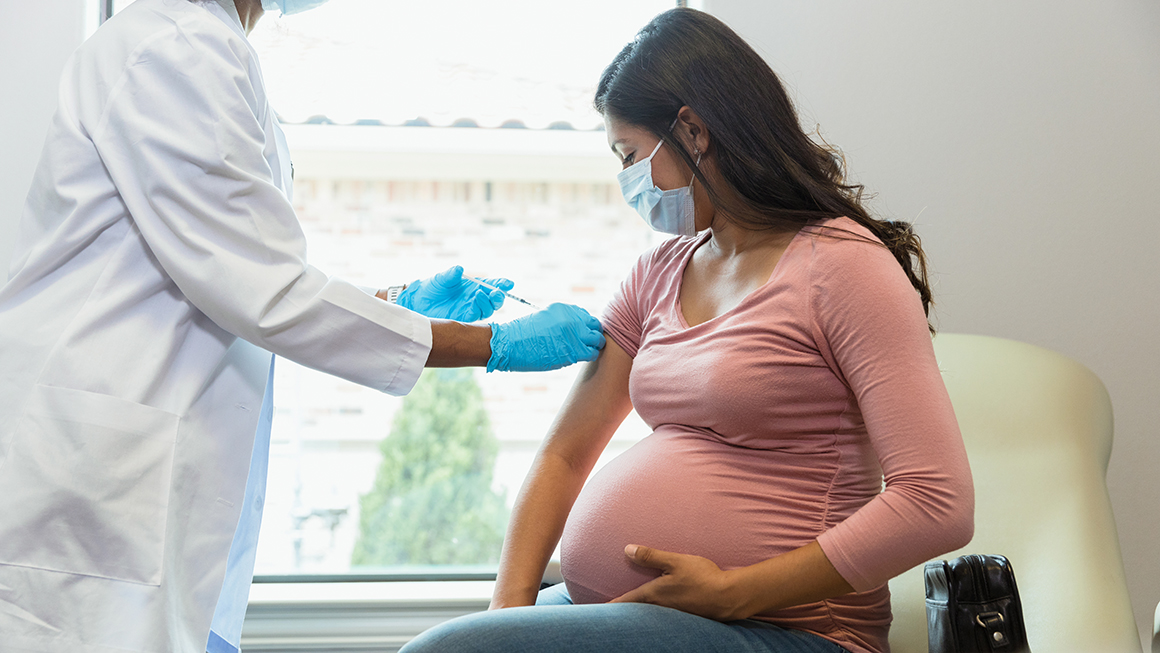
The spread of misinformation during the COVID-19 pandemic has had devastating effects on vaccine uptake.
The World Health Organization (WHO) recognizes a current COVID-19 infodemic, or an overabundance of information, both valid and invalid, leading to mistrust. Misinformation about the COVID-19 vaccine in particular has led many to feel more hesitant about the vaccine or choose not to be vaccinated. Communities of color, including Black, Latinx, and immigrant communities, are more likely to be vaccine hesitant as a result of misinformation because of centuries of abuse, racism, and discrimination within health care, education, and media. In a pooled estimate of 13 studies on COVID-19 vaccine hesitancy, Latinx and Black people had vaccine hesitancy rates 4 percent and 15 percent higher than the overall hesitancy rate.
The Partnering for Vaccine Equity (P4VE) program, funded by the Centers for Disease Control and Prevention, seeks to address this widespread misinformation and racial and ethnic disparities in adult COVID-19 and influenza vaccination. By partnering with 24 community-based organizations (CBOs), the P4VE project aims to build vaccine confidence and empower CBOs to enact community-based approaches to increase vaccine uptake.
One especially promising strategy for informing community members and dispelling misconceptions has been the training of trusted community members to communicate vital, accurate, and up-to-date COVID-19 and influenza information. Through trusted messengers, CBOs can best combat misinformation and increase vaccine confidence.
Misinformation is a key barrier to vaccine uptake
Misinformation about COVID-19 vaccines can vary. Common myths include ideas that the vaccine contains unsafe ingredients or tracking devices, can cause COVID-19 infection or other neurological disabilities, and—as heard by many CBOs (PDF)—can affect fertility. In a national survey, Black respondents disproportionately reported that the vaccine was unsafe, whereas white respondents disproportionately believed the vaccine was safe.
Misinformation often occurs when people are sharing large amounts of information, such as during an emergency like the COVID-19 pandemic. People receive information and guidance from many sources, including newspapers, television, politicians, friends, and health experts. But a large share of people get their information from mainstream web media, including social media sites. They then repost that information, both accurate and inaccurate, to their social circles, increasing its reach.
Within Urban’s P4VE cohort, misinformation is named as one of the key barriers to vaccine uptake. Given the disproportionate impact of COVID-19 on communities of color and the documented disparities by race and ethnicity in vaccination rates, the spread of misinformation is particularly dangerous for the communities represented within the P4VE cohort.
Understanding and equipping trusted messengers to combat misinformation
Many different people can act as trusted messengers, including faith-based leaders, cultural affinity groups, celebrities, political figures, medical experts, radio or television personalities, and other influential community members. CBOs in the P4VE program found that trusted messengers play a crucial role in combating misinformation and fostering trust within hard-to-reach communities because they can deliver accurate information in personalized conversations while addressing language or cultural barriers. In the program’s second year, 3,291 trusted messengers were educated, empowered, and trained across 28 CBOs.
Many CBOs designed and hosted specialized training sessions for their trusted messengers. These sessions aimed to provide accurate and up-to-date information about the COVID-19 and influenza vaccines, dispel fears, debunk myths, and clarify misunderstandings as well as teach trusted messengers motivational interviewing techniques to overcome vaccine hesitancy. With motivational interviewing, many trusted messengers learned to encourage conversations in a nonintimidating way and meet people where they are.
To combat the ongoing spread of misconceptions and misinformation regarding pregnancies and fertility, CBOs trained their trusted messengers to disseminate straightforward, simple, and accurate information about the COVID-19 vaccine and created platforms for them to do so. The Refugee Women’s Network, a CBO serving refugee and immigrant families in Georgia, codesigned a health group called Mothers x Mothers. The group provides a safe space for mothers to connect and share their health concerns, including fears around the COVID-19 vaccine. By equipping mothers in the community with accurate information and providing a platform, the Refugee Women’s Network created a space where hesitant mothers can ask questions and address their concerns before vaccination.
Trusted messengers can counter the spread of misinformation by delivering accurate, culturally sensitive, and linguistically relevant information to their communities. Their ability to develop connections and effectively speak to hard-to-reach audiences facilitates trust and dialogue. As the results achieved by CBOs in the P4VE program demonstrate, trusted messengers serve as invaluable allies in promoting vaccine literacy and ensuring informed decisionmaking for community health.
Let’s build a future where everyone, everywhere has the opportunity and power to thrive
Urban is more determined than ever to partner with changemakers to unlock opportunities that give people across the country a fair shot at reaching their fullest potential. Invest in Urban to power this type of work.